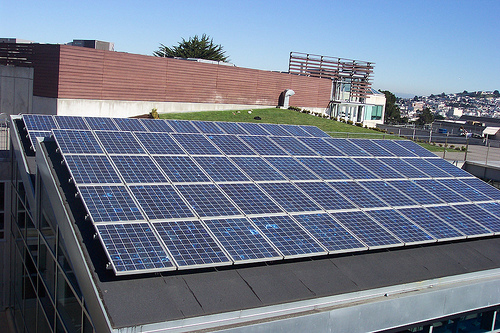 The city of Toronto looking out onto Lake Ontario.Photo: Christopher ChanThe Ontario Power Authority (OPA) has signed feed-in tariff contracts for 384 megawatts of community-owned renewable energy projects in the Canadian province.
The city of Toronto looking out onto Lake Ontario.Photo: Christopher ChanThe Ontario Power Authority (OPA) has signed feed-in tariff contracts for 384 megawatts of community-owned renewable energy projects in the Canadian province.
When completed, Ontario will have the largest installed base of community-owned renewable generation in North America, surpassing community ownership of renewable generation in Minnesota. Nearly one-third of the capacity will be built by Ontario’s aboriginal population.
Within a few years, Ontario will have the largest installation of community-owned renewable resources outside Denmark and Germany.
In an Oct. 12, 2010 report, OPA said that it has signed contracts for 264 megawatts of community-owned projects, and another 120 megawatts of projects owned by Ontario’s aboriginal peoples. The contracts represent 16 percent of Ontario’s 2,500 megawatts of feed-in tariff contracts to date.
No other jurisdiction in North America has made such a concerted effort as Ontario has to guarantee that a portion of the new renewable generating capacity to be built will be owned by its own citizens and native peoples through the province’s innovative feed-in tariff program.
This is in addition to Ontario’s microFIT program (a small renewable energy project program under the umbrella of feed-in tariff programs), which assures connection for homeowners and farmers wanting to generate electricity with solar panels for sale to the grid. There are 20,000 applications for microFIT contracts.
Until the Ontario program, Minnesota led North America in developing community-owned wind generation. In a recent analysis by the Institute for Local Self-Reliance‘s John Farrell, there are 239 megawatts of community-owned projects operating and under construction in Minnesota, or about 10 percent of the 2,500 megawatts installed in the state.
Nearly all of Minnesota’s community-owned wind generation was installed under its Community-Based Energy Development (CBED) program. Minnesota’s CBED and its forerunner were the state’s version of an early feed-in tariff.
Feed-in tariff policy enables farmers, community groups, Native Americans, and Native Canadians to participate directly in the development of their own renewable resources, on an equal footing with commercial power producers.
One-half of all wind generation in Germany, or more than 12,000 megawatts, is owned by local investors. The percentage of local ownership is even higher in Denmark and the Netherlands.
Nova Scotia begins hearings Nov. 8, 2010 on the province’s community feed-in tariff program. The Nova Scotia Utility and Review Board will determine feed-in tariffs for large and small wind, biomass, and tidal power that will go into effect on April 4, 2011. Projects in the 100 megawatt program are set aside for Nova Scotians.
One prime example of a community-initiated project resulting from Ontario’s feed-in tariff program is the $55 million Pukwis project only 80 km (50 miles) north of downtown Toronto. Early next year, the Chippewas of Georgina Island will start construction on a 20 megawatt, ten-turbine project on the island in Lake Simcoe, the first phase of a 54 MW-development. The Pukwis community wind project will be the first aboriginal- and community-owned wind project in Canada and possibly in North America.
The Pukwis wind farm is made possible by the provincial feed-in tariff program, which includes a $0.015/kilowatt-hour bonus payment for projects owned by Ontario’s First Nations and Métis, and a $0.01/kilowatt-hour bonus payment for community-owned projects. The provincial program also pays $0.135/kilowatt-hour for all the generation from the wind turbines.
Pukwis, the Ojibwa word for whirlwind, is a joint venture between the Chippewas of Georgina Island and the Pukwis Energy Co-operative, which will sell shares to local investors in the Greater Toronto Area.
The Ontario Sustainable Energy Association, the principal Canadian advocate for community ownership of renewable generation, will be hosting its annual Community Power conference Nov. 14-17, 2010 at the Metro Toronto Convention Centre. The conference is set to celebrate 100 years of community power in Ontario and includes a specific track for aboriginal project development like that of the Chippewas on Georgina Island.



